Canada announced Thursday targeted sanctions against 17 Saudi nationals linked to the murder of dissident Saudi journalist Jamal Khashoggi but the man who the CIA and Turkish officials believe ordered the killing is not on Ottawa’s sanctions list.
The sanctions target individuals who are, in the opinion of the Canadian government, responsible for or complicit in the extrajudicial killing of Khashoggi at the Saudi consulate in Istanbul, Turkey on Oct. 2, Foreign Affairs Minister Chrystia Freeland announced in Buenos Aires, where she’s attending the G20 Summit.
These sanctions, under the Justice for Victims of Corrupt Foreign Officials Act, also known as the Sergei Magnistsky Act effectively freeze the assets of these individuals in Canada, Freeland said reading from a prepared statement.
Their listing also renders them inadmissible to Canada, she added.
‘The case is not closed’
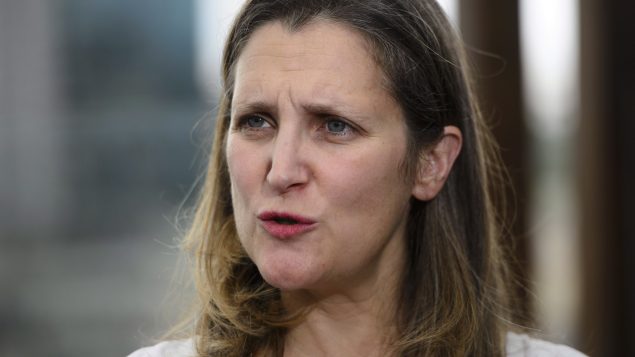
Minister of Foreign Affairs Chrystia Freeland speaks to media on the roof of the Panamericano Hotel in Buenos Aires, Argentina on Thursday, Nov. 29, 2018. (Sean Kilpatrick/THE CANADIAN PRESS)
“The murder of Jamal Khashoggi is abhorrent and represents an unconscionable attack on the freedom of expression and the freedom of the press,” Freeland said. “We continue to call for a credible and independent investigation. This case is not closed.”
Those responsible for Khashoggi’s murder must be held to account and must face justice, she insisted.
When asked why Canada is not sanctioning Saudi Crown Prince Mohammed bin Salman, who has been reportedly identified by the CIA and Turkish investigators as the person who ordered the killing, Freeland said Canada still lacks certainty to directly implicate the crown prince.
“We believe that in naming people and in saying that in the view of the government of Canada someone is responsible for something so serious and so odious, it’s very important to gather all the facts, it’s very important to act and to speak only on the basis of real certainty,” Freeland said. “These are not steps that we take lightly, they are not accusations that we can make lightly.”
An awkward G20 summit
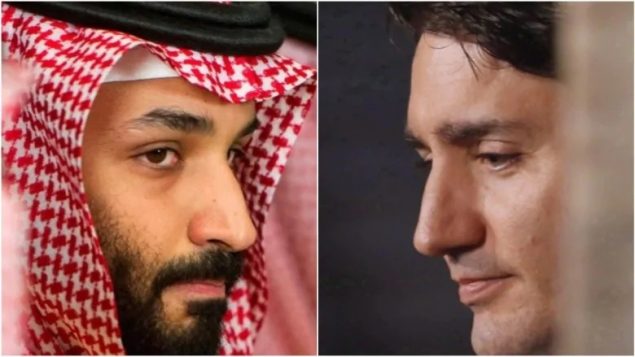
Canadian Prime Minister Justin Trudeau, right, has refused to apologize to Saudi Arabia, which continues to imprison activists despite reforms brought in under Crown Mohammed bin Salman, left. (Cliff Owen/AP, Patrick Doyle/CP )
Canada’s sanctions were announced just as world leaders, including Prime Minister Justin Trudeau and the Saudi crown prince, are gathering in Buenos Aires for the G20 leaders’ summit, which takes place Friday and Saturday.
“We obviously are aware of the membership of the G20 and who will be here,” Freeland said. “Some of the close allies with whom we have been coordinating our work following the murder of Jamal Khashoggi are here as well and we have been working closely with them, this will be an opportunity to continue that work and to do it face to face.”
The federal government has dispatched David Vigneault, head of the Canadian Security and Intelligence Service (CSIS), Canada’s domestic spy agency, to Turkey and Turkish officials have shared information directly with Canada, Freeland said.
Canada demands Yemen ceasefire and reviews arms sales
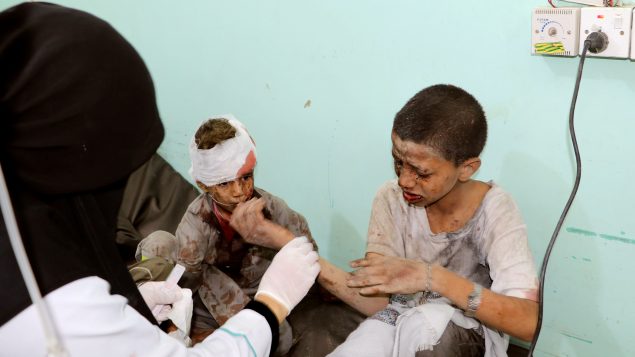
A doctor treats children injured by an airstrike by the Saudi-led coalition in Saada, Yemen August 9, 2018. (Naif Rahma/REUTERS)
Canada is demanding a ceasefire in Yemen where since 2015 Saudi Arabia and United Arab Emirates have been leading a military intervention to prop up the government of ousted Yemeni President Abdrabbuh Mansur Hadi, Freeland said.
In view of Khashoggi’s murder, in view of the fact that the explanation provided to date by Saudi Arabia lacks credibility and coherence, and in view of the continued war in Yemen, Canada is reviewing its arms sales to the oil-rich kingdom, Freeland said.
According to Global Affairs Canada, Saudi Arabia was the largest non-U.S. export destination for Canadian arms manufacturers in 2017. The kingdom received approximately $497.5 million in Canadian military exports, accounting for nearly half of the total value of non-U.S. military exports in 2017, according to the Report on Exports of Military Goods from Canada – 2017.
“Let me emphasise… during this period of review, no new arms export permits are being issued,” Freeland said. “I also want to be clear that in the past we have suspended already issued export permits and, as prime minister has said, that is action that we have taken in the past and we stand prepared to take in the future.”
No commitment to cancel LAV deal
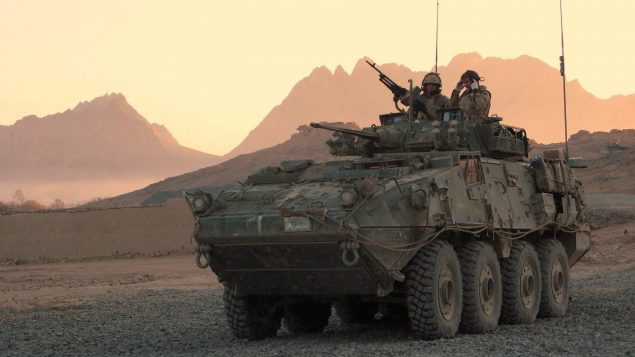
A Canadian LAV (light armoured vehicle) arrives to escort a convoy at a forward operating base near Panjwaii, Afghanistan at sunrise on Nov.26, 2006. (Bill Graveland/THE CANADIAN PRESS)
However, it’s still unclear whether the current review will affect the multibillion deal to supply hundreds of advanced Canadian-made Light Armoured Vehicles (LAV 6.0) to Saudi Arabia.
The documents obtained by CBC News show General Dynamic Land Systems Canada, based in London, Ont., plans to deliver 742 of the modern LAV-6.0s, a reduction from the original 2014 deal, signed under the previous Conservative government and approved by the current Liberal government.
The initial order from the desert kingdom was for 928 vehicles, including 119 of the heavy assault variety equipped with 105 millimetre cannons, according to a report by Murray Brewster, the CBC’s defence correspondent.
Details of the agreement have long been kept under a cloak of secrecy. General Dynamic Land Systems, the Canadian Commercial Corporation (the Crown corporation which brokered the deal) and the Saudi government have all refused to acknowledge the specifics, other than the roughly $15 billion price tag.
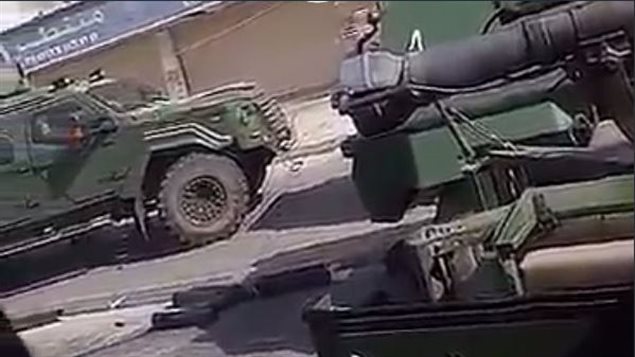
A still image taken from a video posted on Twitter appears to show a Canadian-made Terradyne Gurkha APC (left) on the streets of Awamiyah in the Eastern Province of Saudi Arabia. The APC is produced by Terradyne Armored Vehicles Inc. based in Newmarket, Ontario.
(@SahatAlbalad/Twitter)
Other Canadian arms manufacturers, including Terradyne Armored Vehicles Inc. based in Newmarket, Ontario, are also selling arms to Saudi Arabia.
Terridyne Gurkha armoured personnel carriers operated by the Saudi special police forces were extensively used during a crackdown in the kingdom’s restive Eastern Province last summer.
However, the federal government has found no “conclusive” evidence Canadian-made armoured vehicles were used to commit human-rights violations, Freeland told a parliamentary committee in February.
Canada’s lucrative defence contracts with Saudi Arabia have also survived the recent diplomatic spat between Riyadh and Ottawa.
In August, Saudi Arabia kicked out the Canadian ambassador in the kingdom after Freeland tweeted that Canada was “very alarmed” by the arrest of two additional women activists and urged Saudi authorities to release them.
Saudi Arabia also recalled its ambassador in Ottawa and halted all new investment and trade transactions with Canada, ordered nearly 15,000 Saudi students in Canada to transfer to other countries, and suspended flights to Canada.
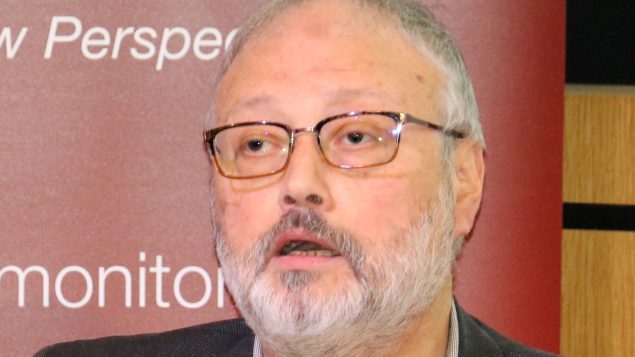






For reasons beyond our control, and for an undetermined period of time, our comment section is now closed. However, our social networks remain open to your contributions.